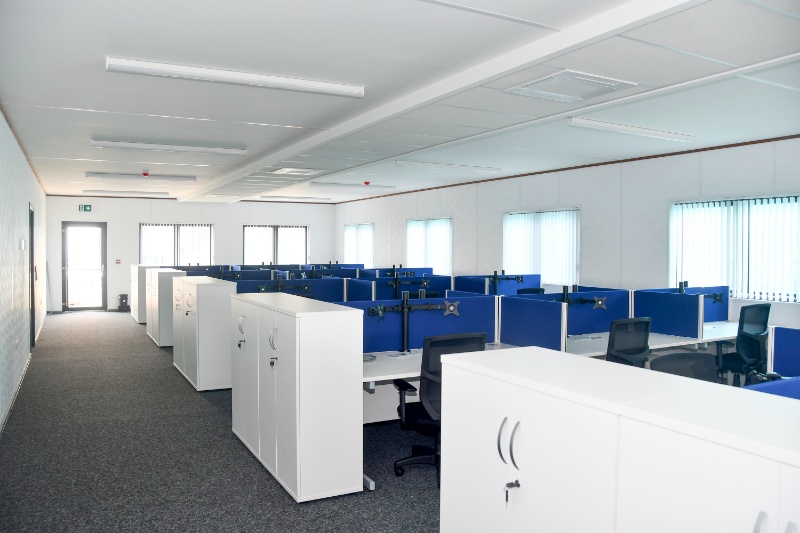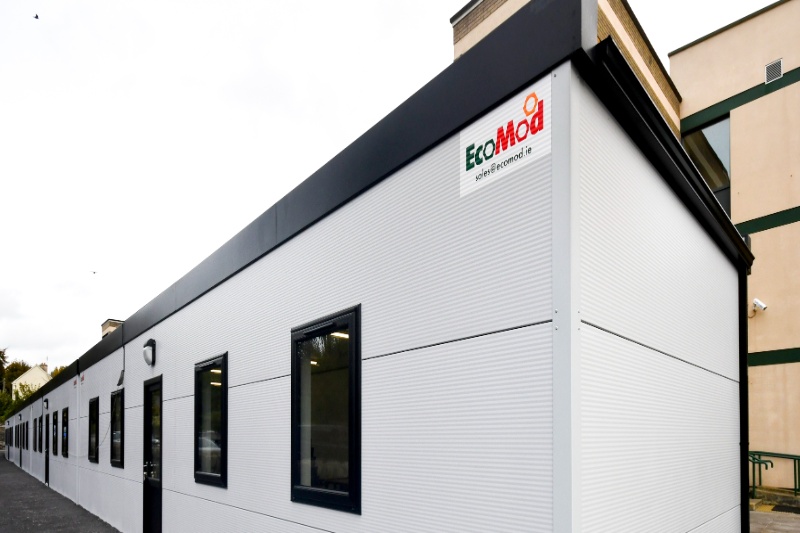In the contemporary world of construction, the concept of sustainability has evolved beyond merely being a popular buzzword; it now stands as an essential direction for the future of the industry, especially in Ireland. As we witness the evolution and innovation within the sector, the sustainability of modular buildings has risen to the forefront, offering a trailblazing and environmentally friendly alternative.
Lending credence to this transformative shift, a comprehensive report by Enterprise Ireland highlights that by employing Modern Methods of Construction (MMC), there’s potential to not only reduce construction costs by a substantial 25% but also significantly improve the overall quality and energy efficiency of buildings.
Therefore, for eco-conscious Irish multinationals and SMEs who are actively seeking more sustainable methods for office space expansion, modular buildings present an invaluable opportunity. In this article, we explore the reasons why modular buildings stand out as the optimal choice for those prioritising sustainable growth for their businesses.
What are modular buildings?
Modular buildings are innovative structures primarily composed of individual sections, commonly referred to as “modules.” These modules are pre-fabricated in specialised facilities away from the final construction site, and once ready, they are transported to their designated location for assembly. Each of these modules is constructed in isolation from the others, ensuring precision and consistency. Upon arrival at the construction site, these pre-made sections are meticulously combined to create a single cohesive structure.
The fundamental distinction between modular and traditional construction methodologies is rooted in their respective approaches. Traditional construction practices typically involve building structures from the ground up directly at the construction site, with materials being shipped and received as and when required. Modular construction, on the other hand, largely takes place in a controlled factory setting. Here, various sections or modules of the building are constructed concurrently, ensuring uniform quality and faster production times.
The sustainability of modular buildings
Modular buildings offer several environmental advantages over their traditional counterparts:
Lower carbon footprint
Modular buildings are meticulously constructed within a controlled factory environment. This specialised setting not only ensures a uniform and consistently high-quality product but also plays a pivotal role in substantially reducing on-site emissions. By transporting the completed modules to the site in a singular or few coordinated moves, the overall carbon footprint is further diminished. This contrasts sharply with traditional construction methods, where there is frequent and continual transit of materials and machinery to and from the site, leading to higher carbon emissions.
Efficient use of materials
In factory environments, precision is of paramount importance. Such attention to detail in construction not only guarantees the integrity of the structure but also promotes efficient utilisation of materials, thereby minimising waste. Modular buildings frequently employ materials that are responsibly sourced, underlining a commitment to sustainability. Additionally, a significant number of components used in these structures are recyclable. This recyclability not only reduces the strain on natural resources but also actively contributes to fostering a more sustainable circular economy.
Reduced construction waste
Traditional construction sites have long been recognised for the considerable waste they generate. However, the advent of modular construction techniques has significantly altered this scenario. Since the majority of the construction work takes place in a controlled off-site environment, the generation of waste is notably reduced. Additionally, any waste that does arise from modular construction can frequently be recycled or repurposed. This not only conserves resources but also propels the overarching goal of sustainability within the construction industry.
Energy efficiency
Modular buildings are widely recognised for their superior insulation capabilities. The precision and control offered in off-site construction enable the integration of high-quality insulation materials and techniques. As a result, these buildings ensure a consistently comfortable indoor climate, regardless of external weather conditions. Over time, this top-notch insulation not only provides occupants with a cosy and pleasant living or working space but also leads to substantial savings on energy bills, making them both economical and environmentally friendly.
Adaptability and reusability
One of the most distinctive characteristics of modular buildings is their inherent adaptability. Designed with flexibility in mind, individual modules can be effortlessly repurposed, expanded upon, or even relocated to suit evolving needs. This level of adaptability not only ensures the longevity of the structure but also minimises the demand for fresh materials and additional construction, promoting sustainability and efficient resource utilisation in the long run.
Witness the sustainability of modular buildings with the EcoSpan
Our EcoSpan modular building stands as a paragon of sustainable modular construction. Central to the design philosophy of EcoSpan is its emphasis on customisability. Every module is meticulously tailored to meet distinct requirements, ensuring a perfect fit for individual needs, all the while strictly complying with the prevailing building regulations.
Moreover, EcoSpan doesn’t just prioritise sustainability but also aesthetic appeal, delivering a high-end finish. This means businesses no longer have to choose between style and sustainable practices.
Opting for EcoSpan not only offers a superior construction solution but also enhances your company’s corporate social responsibility (CSR) profile. By investing in EcoSpan, your enterprise directly supports a green and eco-conscious approach to building.
Common uses of the EcoSpan modular building
EcoSpan’s inherent versatility ensures its adaptability across a broad spectrum of applications. Here are some prevalent ways in which it can be employed:
- Expansive open-plan office areas, fostering collaboration and free flow of ideas
- Dedicated meeting rooms that provide privacy for important discussions
- Professional corporate workspaces, reflecting brand identity and promoting productivity
- Specialised training and induction rooms, designed for effective learning and development
- Comfortable staff facilities, catering to the well-being and comfort of employees
- Spaces tailored for healthcare purposes, including advanced laboratories and clinical areas, to ensure safety and efficiency
Regardless of the specific needs of your multinational corporation or SME, EcoSpan modules are meticulously designed and crafted to align seamlessly with your vision and requirements.
Witness the sustainability of modular buildings with the EcoSpan
Modular buildings have firmly established themselves at the forefront of sustainable and adaptable construction solutions. Among them, the EcoSpan shines distinctly as a sterling example. Specifically designed to cater to the nuanced requirements of multinationals and SMEs, EcoSpan seamlessly melds eco-conscious design with practical functionality.
For companies in Ireland aspiring to integrate top-tier workspace quality with a deep-rooted commitment to environmental responsibility, the EcoSpan solution presents an unrivalled opportunity.
Start your sustainable, modular journey with us here at EcoMod today. Get in touch with us and experience firsthand the unique benefits and differentiators that EcoSpan brings to the table for your organisation.
Don’t forget to also take a moment to browse our blog and resources for the latest news and insights from the world of modular construction.





